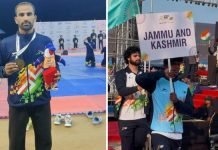Bureaucracy, surveillance and even death threats could do little to deter Juan Marcos Troia from his goal to popularise football
In Argentina, Juan Marcos Troia knew little about Asia. He had heard about the Himalayas but, for all its headline-grabbing violence, was oblivious about a place called Kashmir. Fate, however, had other plans.
Today the 34-year-old calls this insurgency-racked northern Indian state his home, living in Srinagar with his wife Priscila and three daughters. His mission: To train the youth and build a football team that can match up to the level of excellence of the bigwigs in the game.
“They [the youth] have what it takes to be champions,” says the Fifa-certified coach. “The temperate weather, the stamina of Kashmiris and their diet, comprising mutton and vegetables, are some of the things that provide the right mix to take them to a professional level.”
Marcos’s tryst with the contentious state, which is divided between nuclear-armed neighbours India and Pakistan and claimed in full by both, began in 2002 when he arrived in Delhi. “I knew I would be coaching budding football players,” he says, “but in Kashmir! That had never occurred to me.”
Marcos’s original plan, to set up a football club in New Delhi, hit a bump after he failed to register as a club due to restrictions. “We were asked to merge with some other club at the cost of our identity,” he says. “Even the local youths did not seem interested.”
That and the blistering heat made him consider alternatives. Incidentally, the place where Marcos was staying — Jamia Nagar — had a considerable population of Kashmiris and it was then, for the first time, that he heard about Kashmir.
Even better, he was told that the Kashmiris were a football-loving people and some of them had even played for India’s national squad.
The news came as a blessing to Marcos, who was hunting without success for a place in India to begin his football academy. “I was invited by Bihar and Jharkhand, and they even pledged full support. But there were drawbacks — such as the lack of enthusiasm, lack of a football history or unfavourable weather.”
Finally, in 2006, Marcos decided on getting a first-hand idea about Kashmir. “It was a sort of eureka moment when I fully discovered Kashmir. It was ideal for football,” he says, while admitting that the valley’s natural beauty made him fall in love with it at first sight. A lot has happened since.
In 2007 Marcos founded the International Sports Academy Trust (ISAT) to promote football and develop Kashmiri society through an integral youth preparation.
The following year his team participated in big-edition club games. In 2009 it was among those that participated in the J&K football official league championship and last year was part of the state-level Super Division league.
“Kashmiris are very talented and have picked up the art quickly,” Marcos says. He should know, having trained more than 1,000 youths. In fact, even before Marcos founded the academy, about 300 boys jostled to register themselves with the local football association.
ISAT doesn’t charge for coaching. “This is part of our project. We also provide uniforms to our players,” Marcos says, adding that the academy sustains itself on funds given by individual sponsors in Brazil. “There are many people who work for the spread of football and they are always eager to help,” he says. “I submitted them the project of football reviving in Kashmir and they accepted it.”
If Kashmir gave Marcos a mission, he has returned the favour by reviving the game that had suffered not only because of the lack of coaching facilities but also at the hands of the two-decade-long conflict. Though the coach is credited with single-handedly reviving the game, he feels otherwise. “The love for the game was always there. Some youths come from as far as 100 kilometres away to watch a match or get coaching,” he says. “I just acted as a catalyst to exploit [the potential].”
But while adulation and recognition was one aspect that came with being the first Argentinian coach in Kashmir, it has also been fraught with danger, difficulties and disgruntlement.
Marcos has been accused of trying to convert his students to Christianity, has received death threats and has lived the hurt of seeing his pet dogs poisoned by people who wanted to drive home a point. He is getting used to being under surveillance. “I am watched by police and other security agencies. They always run background checks on me,” he says. “And I never go to church because I don’t want trouble-making elements to find an excuse to accuse me.”
India’s home ministry, in 2009, wanted Marcos to leave Kashmir and tried to do so by denying him a visa extension. It was after much campaigning, followed by state government intervention, that prompted New Delhi to relent.
While Marcos does not dwell long on such “personal” problems, it is evident he is pained by events that cause setbacks for his team or the game he so loves. The uprising in the state and regular curfew mean his team can’t always get the practice they need. “Last year was the worst, as, after May, there was literally no practice till October,” Marcos says. “All we could do was make the best possible use of the limited time we had.”
Last year Kashmir for the first time received four Brazilian football players who were to stay there for one year. But that joyous occasion came to an abrupt end when two of them, frightened by the escalating tensions and violence, decided to return home. “That was a sad moment but there wasn’t anything we could do,” Marcos says.
Despite all the problems, however, Marcos has remained true to his objective, even if it has meant pleading with the police to release some of his students who had been arrested on some suspicion or the other. He has also “forgiven” a local youth who was asked by a rival club to threaten Marcos into leaving Kashmir. “I pardoned the boy,” Marcos says matter-of-factly. “I am not here to make enemies. I am just working to promote football.”
Marcos’s parents and five brothers, who live in Argentina, understand that attitude, and despite all their worries, have extended their full support to him.
That attitude, along with the spirit of promoting the game, was also what saw three of his players selected as part of an exchange programme to play at professional clubs in Brazil.
Two of them returned recently after being trained by Fernando Guisini Neto, a former member of the Brazilian national team, who also played for Santos Football Club with Pele.
Mir Abdul Hanan, 19, one of the two lucky footballers, says “playing in the competitive atmosphere of Brazil was a lifetime experience. ISAT has done for me what no one else in Kashmir could have done.”
Hanan’s eyes shine at the prospects of a career that lies ahead, which some years ago was impossible to even think about.
Before the students left for Brazil, they were given a course in Latin American culture and, with the help of Priscila, also learnt to speak fluent Portuguese.
Basharat Baba, the ISAT captain, was one of the three players chosen to go to Brazil. His dreams crumbled when the state government denied him the visa, saying that his father, Bashir Ahmad Baba, once had terrorists links. Though the visa was granted later, after the chief minister intervened, it was too little too late.
Baba’s struggle has also been captured by Oscar-nominated filmmaker Ashvin Kumar in his documentary Inshallah Football, which is getting rave reviews at film festivals around the world.
The film, which revolves around the three main characters — Marcos, Baba and Bashir, also came under the Indian Censor Board’s scanner and got an “Adult” rating because Bashir talks about crude forms of third-degree torture inflicted on him by security agencies.
Marcos, who has Kashmiri features, is often mistaken for a local. “Kashmiris come to me and start chatting in Kashmiri, and it is after a while that they realise that I am not Kashmiri,” he says. But even this has been a double-edged sword.
While on the one hand it sped up his acceptance in society, it backfired when, in 2007, he was beaten up by federal police because “he looked like a Kashmiri but did not speak the language”. The incident created a furore in the media.
Though he speaks of all the problems he has faced, conversation always comes back to football, his team and his helplessness in the face of certain problems that are “beyond his control”.
“Despite doing so much work in Kashmir and the J&K Football Association helping in every way”, Marcos feels handicapped due to the lack of Infrastructure.
“In this season I am yet to start the training session as the football fields are under water,” he says, pointing towards the deluge in a nearby field.
Has the thought of moving to a better place ever crossed his mind, especially because he is flooded with invitations from major clubs or other state governments to leave Kashmir and join their place?
“From Kerala to Punjab, I am receiving official invitations from everywhere,” Marcos says. “And they guarantee every facility. But I have managed to pull through, no matter what the circumstance. And I am not going to leave Kashmir anytime soon.
“The only time I seriously considered fleeing Kashmir was when I received phone calls threatening my family,” he says.
History of football in Kashmir
Football in Kashmir has an interesting history behind it. It was another Westerner, a Christian missionary Tyndale Biscoe, who in 1891 forcibly introduced the game. After bringing a football team from Bombay (now Mumbai), he took it to students of his school in Srinagar. He describes the reaction in the following words in his autobiography. (‘Tyndale-Biscoe of Kashmir’, 1951).
TB: This is a football.
Boys: What is the use of it?
TB: For playing a game.
Boys: Shall we receive any money if we play that game?
TB: No!
Boys: Then we shall not play that game.
Boys: What is it made of?
TB: Leather.
Boys: Take it away! Take it away!
TB: Why should I take it away?
Boys: Because it is ‘jutha’ [unholy] we may not touch it, it is leather.
TB: I do not wish you to handle it. I want you to kick it … and today you are going to learn how to kick it, boys.
Boys: We will not play that ‘jutha’ game.
Some Brahmins (high-caste Hindus) among the pupils were averse to touching leather due to their religious beliefs. But Biscoe was adamant. He plugged their escape routes with stick-wielding teachers who charged at them when they did not kick the football even after five minutes past the blowing of the whistle. Acommotion followed and the football got its first kick, thus starting Kashmir’s first football match. Biscoe records that there were more misses than hits as boys struggled to make contact with the elusive football and their torn robes flew in the melee. Biscoe says that the game ultimately caught their fancy and as he records in his book, “the boys forgot their places on the field, or that they were holy Brahmins”.
*Haroon Mirani is a writer based in Srinagar.
Follow Us
The Kashmir Pulse is now on Google News. Subscribe our Telegram channel and Follow our WhatsApp channel for timely news updates!










